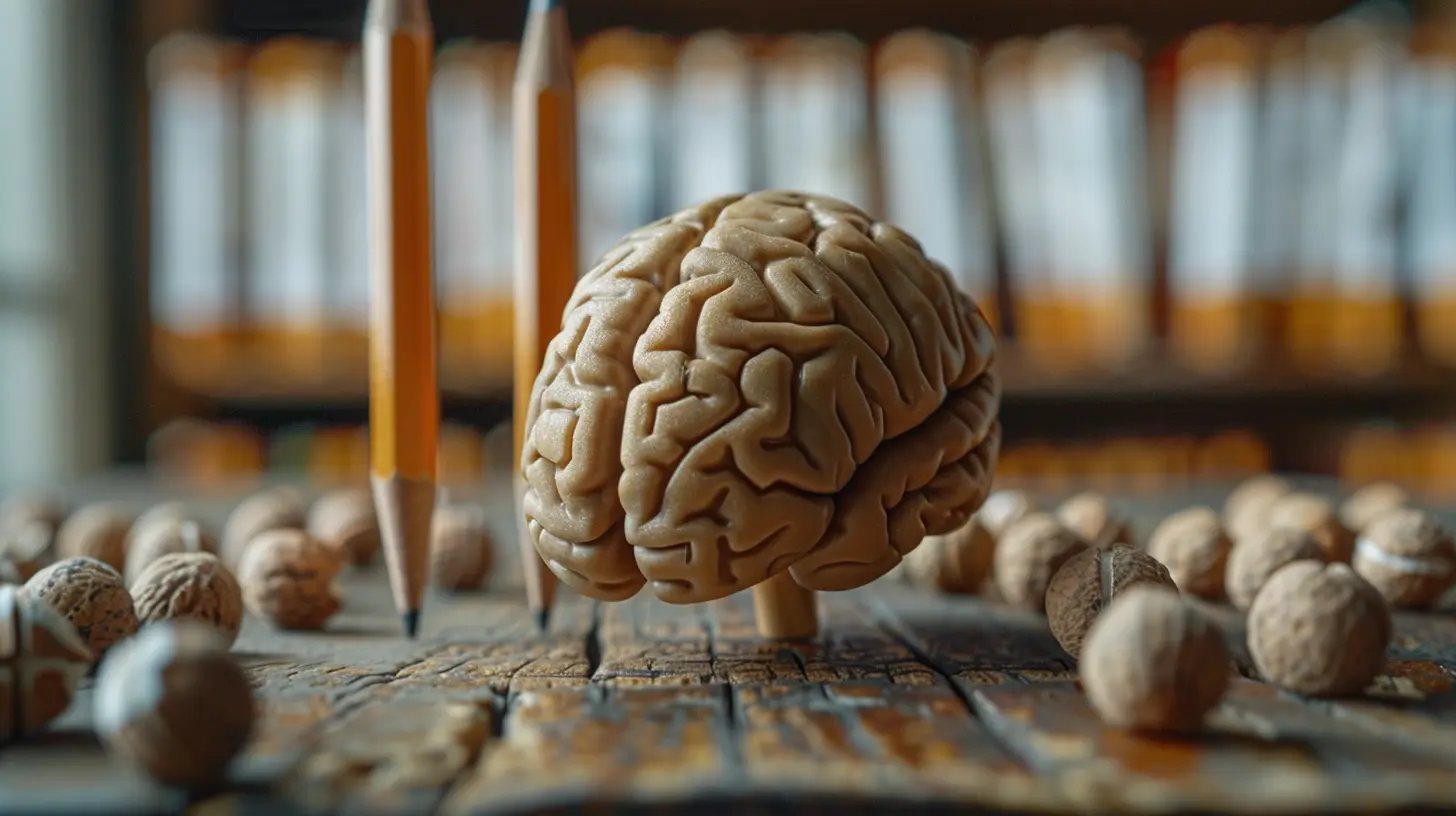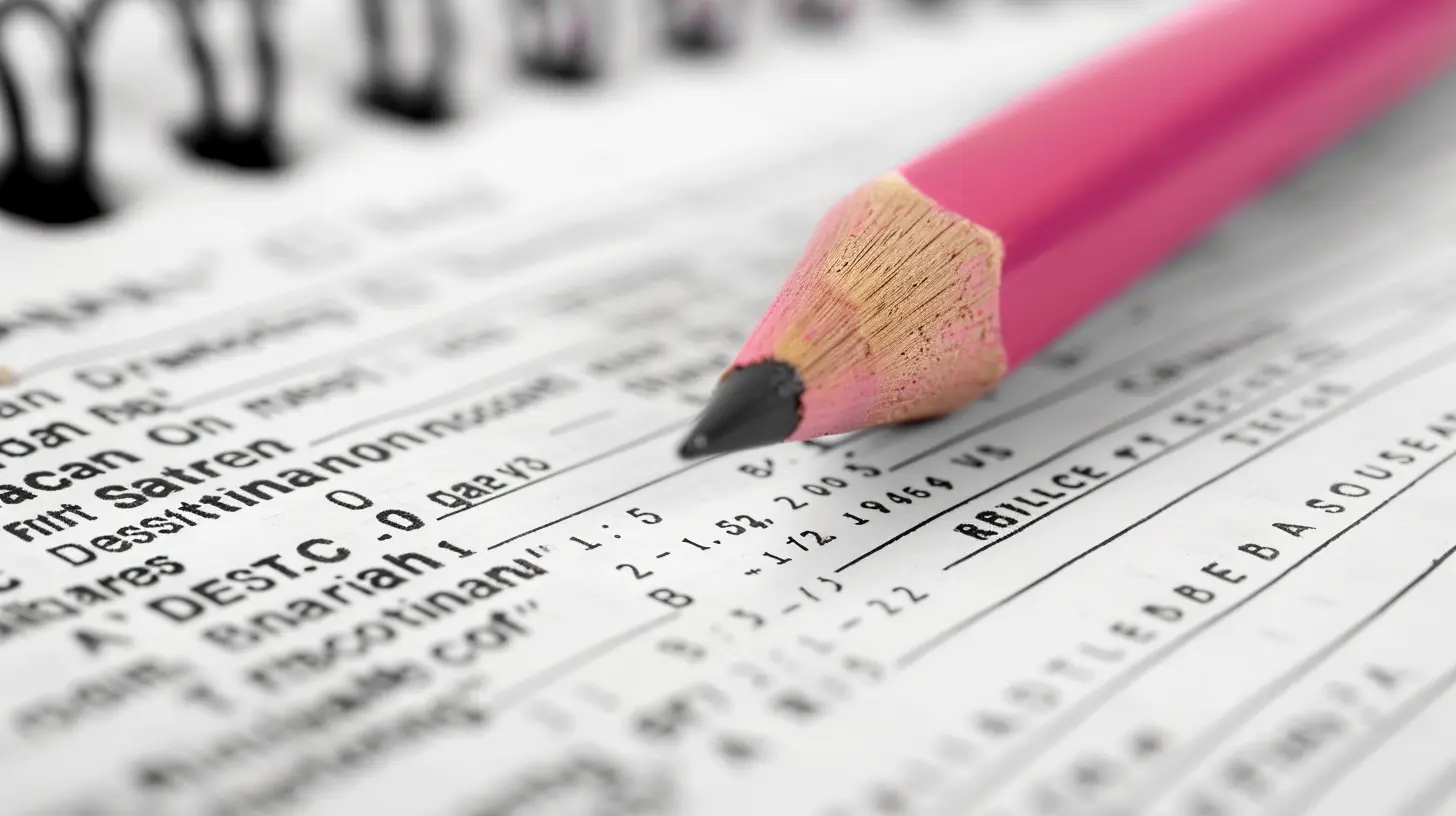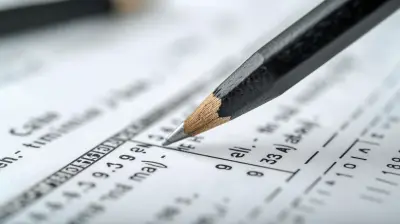The Science of Test-Taking: How to Sharpen Cognitive Skills for Exams
21 January 2025
Exams. Just the word alone can stir up feelings of anxiety and stress in students of all ages. Whether it's a high school final, a college entry exam, or a professional certification test, we’ve all been there. But what if I told you there’s a science behind test-taking? And better yet, what if I told you that you can sharpen the cognitive skills that make you a more effective test-taker? Sounds pretty cool, right?
Don’t worry, this isn’t some magic formula. It’s a combination of proven techniques, habits, and strategies that can boost your brainpower and improve your performance on exam day. In this article, we’re going to dig deep into the science of test-taking and help you understand how to sharpen your cognitive skills to ace those exams.
Table of Contents
1. The Brain and Test-Taking: What's Going On?2. Cognitive Skills That Matter for Test-Taking
- 2.1 Memory
- 2.2 Attention and Focus
- 2.3 Problem-Solving and Critical Thinking
- 2.4 Time Management
3. Effective Strategies to Sharpen Cognitive Skills
- 3.1 Practice Testing
- 3.2 Active Learning Techniques
- 3.3 Mindfulness and Meditation
- 3.4 Healthy Lifestyle Choices
4. Test-Taking Techniques That Tap Into Cognitive Skills
- 4.1 The Power of Skimming
- 4.2 The Process of Elimination
- 4.3 Making Educated Guesses
5. Conclusion: You’re Smarter Than You Think

The Brain and Test-Taking: What's Going On?
Before we jump into the nitty-gritty, let's take a moment to talk about what's happening inside your head when you're taking a test. You might have felt like your brain was working overtime during an exam, right? That’s because it is.When you're sitting down for a test, several parts of your brain are working together. Your prefrontal cortex, which is responsible for decision-making and problem-solving, is in overdrive. Your hippocampus is there to help you retrieve memories, like when you need to recall that pesky math formula you memorized last night. And of course, your amygdala is doing its best to manage your stress levels.
Understanding this can be empowering. Your brain is a muscle, and like any muscle, it can be trained. The more you work on those cognitive skills, the better you'll be at handling the pressure and demands of exams.
Cognitive Skills That Matter for Test-Taking
Not all cognitive skills are created equal when it comes to exams. Some are more critical than others, and the good news is that you can improve them with practice. Let’s break down the key cognitive skills that play a role in test-taking.1. Memory
Memory is probably the most obvious one, and it’s more than just memorizing facts. There are different types of memory at play when you’re taking a test. Short-term memory helps you remember things you just read in the question, while long-term memory helps you recall things you studied days or weeks ago.Improving memory isn't just about cramming. It’s about finding ways to encode and retrieve information more effectively. Techniques like spaced repetition and mnemonics can help you retain information over the long haul.
2. Attention and Focus
Ever tried to study with a million distractions around you? Yeah, not fun. Focus is key to test-taking success. Your ability to concentrate on the task at hand without getting sidetracked by all those racing thoughts is a cognitive skill that can make or break your exam performance.Developing focus isn't just about clearing distractions. It also involves training your brain to stay engaged with the material for longer periods. Building blocks like active listening, mindfulness, and even brain games can increase your attention span.
3. Problem-Solving and Critical Thinking
Exams aren’t just about regurgitating facts. They often require you to think critically, analyze information, and solve problems. Whether it's figuring out the best way to approach an essay question or solving a tricky math problem, problem-solving and critical thinking are essential cognitive skills.The good news? These skills can be honed through practice. By working on puzzles, taking practice exams, and engaging in exercises that challenge your reasoning abilities, you can sharpen your problem-solving skills.
4. Time Management
Okay, time management might not sound like a "cognitive skill," but it absolutely is. During a timed exam, you’re constantly juggling your mental resources to ensure you’re completing tasks efficiently without rushing through them or spending too much time on any one question.Effective time management during a test is a skill that can be developed by practicing under timed conditions and learning to gauge how long different types of tasks will take.
Effective Strategies to Sharpen Cognitive Skills
Now that you know the cognitive skills that matter for test-taking, let’s talk about how you can sharpen them. There’s no one-size-fits-all solution, but these tried-and-true strategies can help you boost your test-taking brainpower.1. Practice Testing
Sounds obvious, but practice testing is one of the best ways to improve your cognitive skills. The more you simulate the actual exam conditions, the better your brain gets at handling the pressure. Plus, practice tests help you identify areas where you're weak and need more focus.Research shows that retrieval practice—trying to recall information from memory—actually strengthens memory. So, even if you don't get everything right on a practice test, you're still doing your brain a favor.
2. Active Learning Techniques
Forget passive reading or highlighting. If you really want to sharpen your cognitive skills, you need to engage in active learning. This could mean summarizing what you just read in your own words, teaching the material to someone else, or creating mind maps to visualize connections between concepts.Interactive techniques force your brain to engage with the material more deeply, leading to better retention and understanding.
3. Mindfulness and Meditation
You might think mindfulness is just for yogis or stressed-out office workers, but it can help you become a better test-taker too. Mindfulness and meditation can help reduce anxiety, improve focus, and even boost memory.Even just a few minutes of deep breathing or meditation before a study session can help calm your mind and put you in the right headspace to absorb information.
4. Healthy Lifestyle Choices
It turns out that diet, sleep, and exercise aren’t just good for your body—they’re good for your brain too. Regular physical activity has been shown to improve cognitive function, while proper sleep is essential for memory consolidation. And don’t forget about your diet! Foods rich in omega-3s, antioxidants, and vitamins can enhance brain function.Test-Taking Techniques That Tap Into Cognitive Skills
Now that you've honed your cognitive skills, it's time to put them to work. On test day, there are several techniques you can use to leverage your brainpower and optimize your performance.1. The Power of Skimming
When you first get your test, don't dive in headfirst. Instead, take a minute to skim through the entire test. This gives your brain a roadmap of what’s ahead, helping you manage your time and focus better. It also allows you to spot easy questions that you can knock out quickly, leaving more time for the tougher ones.2. The Process of Elimination
Multiple-choice questions can be tricky, but one of the best strategies is the process of elimination. Even if you're unsure of the correct answer, eliminating obviously wrong choices increases your odds of guessing correctly. Plus, the act of eliminating answers can trigger your memory, helping you recall information you might have forgotten.3. Making Educated Guesses
Sometimes you just don’t know the answer, and that’s okay. But rather than leaving a question blank, make an educated guess. Use context clues from other questions, rely on your intuition, and apply any partial knowledge you have. Believe it or not, your brain has a way of making connections even when you're not consciously aware of them.Conclusion: You’re Smarter Than You Think
The science of test-taking might sound complicated, but it boils down to one simple truth: You can train your brain to perform better on exams. By focusing on sharpening your cognitive skills—like memory, attention, and problem-solving—and applying effective test-taking strategies, you’ll be ready to tackle any exam that comes your way.Sure, studying is important. But now you know there's more to it than just cramming facts into your brain. It’s about working smarter, not harder. And the best part? The skills you build for test-taking will benefit you in all areas of life, from work to personal challenges.
So, the next time you sit down for an exam, remember: You've got this. Your brain is sharper than you think, and with the right strategies, you’ll be unstoppable.
all images in this post were generated using AI tools
Category:
Standardized TestingAuthor:

Eva Barker
Discussion
rate this article
19 comments
Lacey McKay
This article offers valuable insights into enhancing cognitive skills for exams. Incorporating these techniques can significantly improve performance and build confidence. A great resource for students looking to excel!
March 31, 2025 at 10:45 AM

Eva Barker
Thank you for your kind words! I'm glad you found the insights valuable for enhancing cognitive skills and boosting confidence during exams.
Zanthe Harris
Test-taking is like a dance party for your brain! Let’s groove to those cognitive skills and waltz our way to success!
March 14, 2025 at 12:02 PM

Eva Barker
Absolutely! Embracing test-taking as a fun and dynamic process can enhance cognitive skills and make studying more enjoyable. Let’s keep the rhythm going!
Kestrel Potter
This article offers valuable insights into enhancing cognitive skills for exam success. Understanding the science behind test-taking empowers students to optimize their preparation strategies, manage anxiety, and improve focus. Practical tips like active recall and spaced repetition can significantly boost performance.
February 20, 2025 at 9:50 PM

Eva Barker
Thank you for your feedback! I'm glad you found the insights on cognitive skills and practical tips helpful for exam preparation.
Zachary McKnight
This article effectively explores cognitive strategies to enhance test-taking skills, emphasizing practice techniques and psychological preparation crucial for maximizing performance and reducing anxiety.
February 9, 2025 at 12:09 PM

Eva Barker
Thank you for your insightful comment! I'm glad you found the article helpful in highlighting the importance of cognitive strategies and psychological preparation for optimal test performance.
Taryn McFee
This article effectively explores the cognitive strategies essential for enhancing test-taking skills. By emphasizing techniques such as active recall, spaced repetition, and mindfulness, it provides valuable insights for students aiming to improve their performance and reduce exam-related anxiety. A must-read!
February 1, 2025 at 4:57 AM

Eva Barker
Thank you for your thoughtful feedback! I'm glad you found the techniques helpful for improving test-taking skills.
Soliel Lamb
This article provides valuable insights into improving cognitive skills for exams. The strategies outlined are practical and grounded in research, making them accessible for students. However, I would have appreciated more emphasis on managing test anxiety, as it's a significant barrier for many learners. Overall, a helpful read for exam preparation.
January 29, 2025 at 8:12 PM

Eva Barker
Thank you for your feedback! I appreciate your insights on the importance of managing test anxiety and will consider incorporating more on that topic in future articles. I'm glad you found the strategies helpful!
Astranor McCollum
Who knew exams could be a science project? Sharpening cognitive skills is like upgrading from a tricycle to a rocket ship—zooming past those test questions with style! Ready, set, study!
January 29, 2025 at 11:44 AM

Eva Barker
Absolutely! Turning studying into a strategy can indeed propel us to new heights. Let’s gear up for success!
Uzi Alexander
Great insights on enhancing test-taking skills effectively!
January 28, 2025 at 8:33 PM

Eva Barker
Thank you! I'm glad you found the insights helpful for enhancing test-taking skills.
Leo Rios
This article brilliantly highlights the intersection of cognitive psychology and test-taking strategies. By focusing on techniques like spaced repetition and active recall, students can enhance their retention and understanding, ultimately transforming exams from mere assessments into opportunities for deeper learning.
January 27, 2025 at 12:45 PM

Eva Barker
Thank you for your insightful comment! I'm glad you found the connection between cognitive psychology and effective test-taking strategies valuable.
Isaiah McIntyre
Turn test-taking into a brain-boosting adventure! With these tips, you’ll be acing exams and flexing those cognitive muscles in style!
January 26, 2025 at 2:00 PM

Eva Barker
Thank you! I'm glad you found the tips helpful for turning test-taking into an engaging challenge for your brain!
Keira McClellan
This article beautifully highlights the connection between cognitive skills and test performance. Embracing these strategies can empower students to not only excel in exams but also enhance their overall learning experience. Keep striving!
January 26, 2025 at 5:19 AM

Eva Barker
Thank you for your thoughtful comment! I'm glad you found the connection between cognitive skills and test performance valuable. Let's continue to empower students together!
Eloise Holland
While useful, the article oversimplifies cognitive processes; test-taking strategies need deeper exploration.
January 25, 2025 at 7:54 PM

Eva Barker
Thank you for your feedback! I appreciate your perspective and will consider a deeper exploration of cognitive processes in future discussions.
Naomi Gonzalez
Unlock your potential by mastering the science of test-taking! Developing cognitive skills not only boosts your exam performance but also empowers you for lifelong learning. Embrace the challenge and watch your confidence soar!
January 25, 2025 at 12:13 PM

Eva Barker
Thank you for your insightful comment! Mastering test-taking truly enhances cognitive skills and fosters confidence, setting the stage for lifelong learning.
Kassandra McGivern
Great insights on enhancing cognitive skills for exams! Incorporating practical strategies can immensely boost students' confidence and performance. Thanks for sharing!
January 24, 2025 at 7:25 PM

Eva Barker
Thank you for your kind words! I'm glad you found the insights helpful. Good luck with your studies!
Andrew McGillivray
Embracing the science of test-taking can transform your approach to exams! By sharpening cognitive skills, you not only boost your performance but also build confidence. Remember, each challenge is an opportunity to grow—stay curious, practice diligently, and watch your efforts lead to success!
January 24, 2025 at 12:34 PM

Eva Barker
Thank you for your insightful comment! Embracing these strategies truly makes a difference in exam preparation and overall confidence. Let's keep cultivating that growth mindset!
Cora Pope
Awesome article! It's so great to see the science behind test-taking laid out so clearly. Remember, every exam is just a chance to show off what you know. With these tips, you'll sharpen your skills and walk in with confidence. You've got this! 🎉📚
January 23, 2025 at 7:29 PM

Eva Barker
Thank you so much! I’m glad you found the article helpful. Best of luck with your studies! 🎉📚
Lilith Moore
Who knew acing exams could be as scientific as baking a soufflé? Just remember: the right mix of cognitive skills, a dash of caffeine, and a sprinkle of deep breaths can turn test anxiety into a masterpiece. Bon appétit... I mean, good luck!
January 23, 2025 at 1:33 PM

Eva Barker
Absolutely! Just like baking, mastering test-taking requires the perfect blend of skills and a calm mindset. Your metaphor is spot on—best of luck to all!
Selkie Mahoney
Great insights! Understanding cognitive strategies can significantly enhance test performance. Implementing these techniques not only boosts confidence but also deepens understanding of the material.
January 21, 2025 at 8:15 PM

Eva Barker
Thank you! I’m glad you found the insights valuable. Harnessing cognitive strategies can indeed make a significant difference in test performance and overall understanding.
Rachel Daniels
In the dance of knowledge, tests reveal our grace; with sharpened minds and steady hearts, we embrace the challenge, unlocking wisdom's embrace.
January 21, 2025 at 12:11 PM

Eva Barker
Thank you for your poetic insight! Embracing challenges does indeed enhance our cognitive skills and unlock deeper understanding.
MORE POSTS

Why Extracurricular Activities are Key to College Applications

Lesson Plans that Foster Growth Mindset and Resilience

The Power of Extracurricular Activities in Shaping Student Success

How to Incorporate Social-Emotional Learning into Daily Lessons

Music and Movement: Why Both Matter in Early Learning

The Benefits of Listening to Music While Studying

Building Confidence in Students Through Well-Structured Lesson Plans

Cultural Competence in the Global Classroom

Why Schools Should Prioritize a Wide Range of Extracurriculars

Music as a Tool for Social-Emotional Learning

The Role of Critical Thinking in Standardized Test Performance

"Creating Emotionally Safe Spaces for Learning